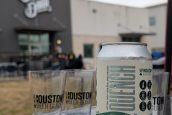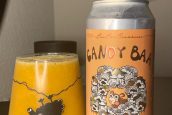Editorial: Ken Goodman doesn’t look good in wool (HB3287)
Note: this post represents the sole opinion of me, Nathan Miller, and does not reflect an endorsement on behalf of Houston Beer Guide. From time to time, we will run editorial/opinion pieces when we feel a need. These are not “news,” nor “reviews,” nor are they endorsed posts, other than by the person who writes them.
When I wrote the piece on Karbach selling out to Anheuser-Busch, it was with no great pleasure, nor any great joy. In fact, I was devastated. As I tweeted the day after the post ran, “They had the resources to truly spur Houston beer innovation,” and that was what truly saddened me. “They took the easy way out in every decision. And that culminated in yesterday’s news.”
Of course, for me, the most devastating part of the sellout was not that Karbach had chosen the easy way out by “partnering” with another, larger investor, but how Karbach had executed the move: with Anheuser-Busch InBev, a stalwart enemy of craft beer. ABI has used their profits for numerous (questionable) tactics intended to crush craft beer, from purchasing distributors to erode the three-tier protections to disincentivizing craft support from distributors they haven’t bought (or can’t, due to the integrity of states where that’s still illegal) to sponsoring and lobbying for legislation that hurts craft beer. We’ve seen the impact of ABI’s influence in the Texas State Legislature all the way back to 2011, and we continue to see it today.
So when I saw that Karbach founder Ken Goodman wrote an opinion piece which the Houston Chronicle saw fit to print, I had no choice but to read it, knit my eyebrows, turn my head slightly askew, and finally chuckle confusedly. Ken Goodman, the wolf who built a business with the prime goal of selling it to the highest bidder, suddenly plays the role of the sheep in a flock of craft brewers, suggesting that a bill currently working its way through the Texas legislature, HB3287, would hurt craft beer growth.
Well, Ken, I have to say, I don’t think wool is the right fabric for you.
Reading the bill, I can’t help but notice that not too much is actually changing: whereas previously a single brewery couldn’t sell conduct on-premise sales if they produced 225,000 barrels (a staggeringly large amount – Saint Arnold finds their production at around 50-60k per year), now that will extend to breweries whose overall company produces such a high amount of beer. In other words, if this bill passes, Karbach, now owned by megalithic ABI, will no longer be able to legally operate a tap room where they sell beer. Of course, with ABI’s deep pockets, they can always give it away, if they so choose, as so many Texas craft breweries were forced to do before 2013.
Sure, there may be some craft casualties: Oskar Blues, whose 2015 production was 192,000 barrels, will likely be excluded given the increase in production at their Austin facility. Similarly, Deep Ellum’s ownership group would be significantly discouraged from purchasing any other breweries, as they too might find themselves crossing that 225k barrier. And the increasingly-poorly named Independence Brewery in Austin, partially owned by Lagunitas/Heineken may also be impacted. But to say that such a bill “will crush craft beer,” as Ken puts it, is not only silly, it’s disingenuous: the result of this bill passing would likely do the opposite, providing a competitive advantage for smaller breweries that isn’t afforded to massive, established players.
While ABI might find themselves with buyer’s remorse should HB3287 pass the Texas Legislature, and while that might (I have no insight into the conditions of the purchase) inconvenience or even devalue Ken Goodman’s position, I cannot imagine a scenario in which this bill will hurt small Texas breweries.
We all hope we’ll one day be rich, there’s no doubt about that. But the truly evil thing we can do once we get there is hurt others from achieving the same dream. As far as I can tell, this is a bill that will protect small breweries, the heart of craft beer, from the unbalanced power of established players. Might it discourage breweries from selling out or “attract investment partners, as we did with Anheuser-Busch,” as Ken so elegantly states? I can only hope so.
One final note: In a time of deep media distrust, I think the Houston Chronicle should be ashamed to run a piece that is so clearly imbalanced, without any rebuttal or accompanying disclaimer. Karbach is by no means a yardstick to measure how Houston, a proud, honorable city, should encourage its businesses.














2 Comments
Michael Graham
I agree that Mr Goodman isn’t the best messenger, but the message is still valid. The Texas Craft Brewer’s Guild, comprised of the vast majority of Texas’s small and independent breweries, is also against the Bill. If it passes, every brewery in Texas will be devalued. Investors will be less willing to invest, lenders will be less willing to lend, and breweries will find it more difficult to finance growth. This Bill will do nothing positive for small Texas breweries – it’s only purpose is to increase the control distributors have over the Texas beer market.
I personally no longer support breweries who have sold out to ABI, but I want that to be my choice and not a government mandate.
Michael Graham
Co-Founder
Austin Beerworks
Laura Quinn
Shiner – Texas’s largest craft brewery – is impacted by this barrel limit as well. They’re currently the only craft brewery in Texas that isn’t allowed to sell beer on site. They’re unable to test out “small batch” beers sold on draft directly to consumers. Packaging and distribution is a huge portion of beer manufacturing, and preventing them from testing out new ideas is limiting their creativity and the potential discovery of a great new beer!